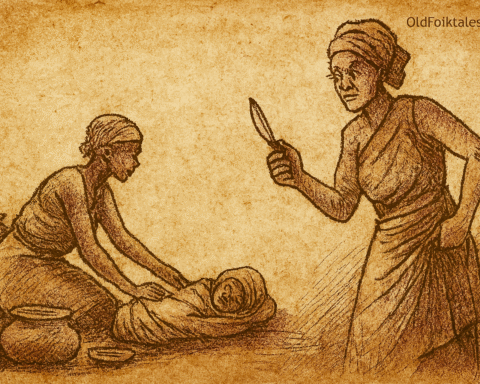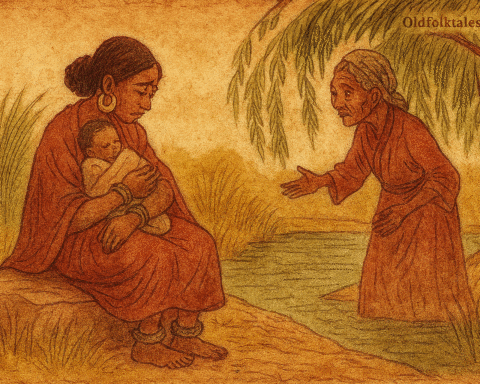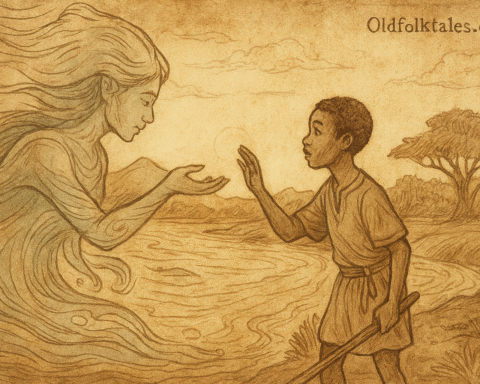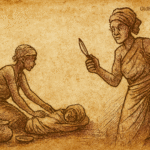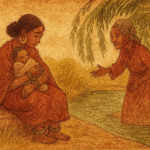Long ago, before men knew all the ways of the gods, Eshu the divine trickster walked the earth. He loved to test people, for through trials he revealed their true hearts. Among the Orishas, Eshu was known as the one who brought confusion but also wisdom, for his games taught lessons no one could forget.
In a certain Yoruba village, the people lived well. They farmed yam, cassava, and maize. They held festivals for Sango, Oshun, and Ogun, and their drummers filled the air with bata rhythms that echoed to the hills. The villagers were proud of their unity, boasting that nothing could divide them. When they offered sacrifice at the shrine, they praised themselves as the strongest of all communities.
Eshu heard these words and laughed. “So they believe nothing can break them,” he said. “Let me walk among them and see how firm their bond truly is.”
One morning, when the sun rose red over the horizon, Eshu disguised himself as a wandering farmer. On his head he wore a tall hat, red on one side and black on the other. He carried a walking stick and leaned upon it as he passed between the farms. The villagers greeted him politely as custom demanded. But soon a quarrel began.
Two farmers worked in fields divided by a narrow path. When Eshu walked past, one farmer said, “Did you see that man’s fine red hat?” The other replied, “What are you saying? The hat was black!” They argued until their voices carried through the village. More people came and joined the dispute. Some swore the stranger’s hat was red. Others swore it was black. Soon friends became enemies, and insults flew like stones.
Eshu returned the next day in the same disguise, but this time he turned the hat around so that each farmer saw the opposite color from before. The quarrel grew hotter. Families took sides. The drummers stopped playing, the market grew silent, and even children repeated the anger of their parents. The once proud unity of the village had been broken by a single hat.
When the quarrel reached the king’s palace, Eshu appeared again. He stood in the middle of the square and removed his hat. The people gasped, for they saw at last that the hat was red on one side and black on the other.
“You who boast of unity,” Eshu thundered, “see how easily you were divided. A simple trick has torn apart your peace. If you cannot listen to one another, how will you stand against greater trials?”
The villagers bowed their heads in shame. They realized that pride had blinded them, and that true unity required patience, humility, and trust. From that day, they learned to seek harmony before judgment, for they remembered how Eshu had tested them.
Moral Lesson of How Eshu Tested the Village
The story teaches that harmony is greater than pride. When people listen to each other with patience, they grow stronger. But when they allow arrogance and suspicion to rule, even the smallest test can divide them. The wisdom of Eshu reminds us that peace must be nurtured carefully, for it is the foundation of community.
Knowledge Check on How Eshu Tested the Village
Who is Eshu in Yoruba tradition and what role does he play in this story?
Answer: Eshu is the trickster Orisha who tests humans through confusion and challenges. In the story he disguised himself as a farmer to test the unity of the villagers.What did the villagers boast about before Eshu came to test them?
Answer: They boasted about their strong unity and claimed that nothing could divide their community.How did Eshu use his hat to create conflict among the villagers?
Answer: He wore a hat that was red on one side and black on the other, making each farmer see a different color and argue about what they saw.What happened when Eshu turned his hat around the next day?
Answer: The farmers saw the opposite colors from before, which deepened the quarrel and divided the entire village further.What lesson did the villagers learn after Eshu revealed the truth about his hat?
Answer: They learned that pride and arrogance had blinded them, and that true unity comes from humility, patience, and listening to one another.What is the central moral of the Yoruba folktale How Eshu Tested the Village?
Answer: The moral is that harmony and understanding are more valuable than pride, and that a community must work to maintain peace to remain strong.
Cultural Origin
This folktale comes from the Yoruba people of southwestern Nigeria. It reflects their belief in the Orishas, divine beings who guide and test humanity. Eshu, the trickster Orisha, plays a central role in Yoruba spirituality as the messenger between humans and the gods, and his stories are told to teach wisdom about unity, humility, and respect within the community.

